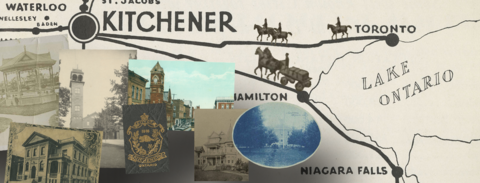
Local history resources
Special Collections & Archives (SCA) holds a variety of resources related to the local and urban history of Kitchener-Waterloo.
Many of SCA’s family and institutional holdings include the archives of local businesses and organizations such as Dare Foods Limited, the Dominion Rubber Company, Electrohome, and Fritsch Pharmacy. In addition, the department maintains family papers related to the Breithaupt, Bolender Ball, Ratz, and Schantz families, among others.
The department is also home to the Kitchener-Waterloo Photographic Negative Collection, which documents local news events, community activities, regional development, and human-interest stories between 1938-2001.
Archives
The Archives Database is where you can search the descriptive records for fonds and collections held by the department. You can browse records by Collection strength or do a keyword search by using the search box at the top right of the page and making use of the various navigation filters provided as part of the results listing page. The Getting Started page provides more information about using the Archives Database.
Rare books
You can also identify rare books, serials, periodicals, and maps held by the department by using the Library’s catalogue. After conducting a keyword search you can filter to Dana Porter Library – Special Collections & Archives under the Waterloo Library location options.

Waterloo Digital Library
The Waterloo Digital Library (WDL) is where you can browse a selection of records that have been scanned for access online.
Records pertaining to the local history of the Region of Waterloo appear throughout. You can browse the site by clicking into the various collections or by doing a keyword search in the search box at the top right of every page.
Local history collections on the WDL include:
Print material
Elizabeth and Gerald T. Bloomfield texts
A number of titles by historians Elizabeth Bloomfield and Gerald T. Bloomfield have been digitized and made available via the Internet Archive. Comprising indexes, bibliographies, biographical overviews, and historical maps, the titles are exhaustive and invaluable resources for anyone interested in the early economic and social development of both the Region of Waterloo and Ontario as a whole. Of particular note to regional history enthusiasts is Waterloo County to 1972: An annotated bibliography of regional history.
Directories
Among the most useful tools for the local historian are business and city directories.
The Library's collection currently includes a number of nineteenth and early twentieth century directories for the Waterloo region. To find directories in the library catalogue, search for the following subject headings:
- Waterloo (Ont. : Regional municipality)--Directories.
- Kitchener (Ont.)--Directories.
- Waterloo (Ont.)--Directories.
Kitchener Public Library has many digitized directories.
Maps
A number of maps are held in Special Collections & Archives (SCA). Many maps are catalogued and can be found by searching in the Library catalogue for the relevant city. Several appear in fonds maintained by the department including the Grand River Conservation Authority fonds and the Schantz Russell Family fonds.
A selection of SCA's historical maps can be viewed online on the Waterloo Digital Library.
Fire Insurance plans
Fire insurance plans are large scale urban maps or set of maps of a community. They are an excellent way to look at the development of a city of over time. Several are held as part of SCA and the Library's Geospatial Centre.
Additional local history resources
- Archives and Research Conestoga
- Cambridge Archives
- Grace Schmidt Room of Local History
- Kitchener Public Library's House Research Guide
- Cambridge Public Library Local History
- Laurier Archives search
- Mennonite Archives of Ontario
- Region of Waterloo Archives
- Region of Waterloo Library Digital Collections
- Waterloo Historical Society
- Waterloo Public Library Digital Collection
- Waterloo Region Generations
Records pertaining to the history of the region can also be found on websites dedicated to provincial cultural heritage holdings.
- Archeion
- Archives of Ontario
- Digital Archive Ontario
- Multicultural History Society of Ontario
- OurOntario
- Ontario Community Newspaper Portal
- Ontario Genealogical Society
Finally, certain campus units have made historical documents relevant to the University of Waterloo available online. They include: